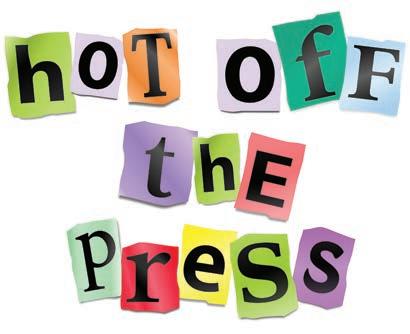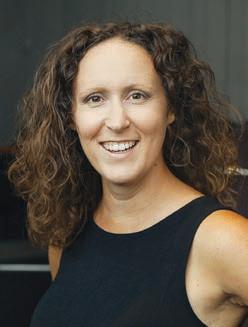
7 minute read
Hot off the Press
Plays About Family Legacy
Our regular column on plays that have recently become available for licensing focuses in this issue on works that examine the relationships of parents and children.
by Zackary Ross
Like many parents during the pandemic, I spent the last year working from home and overseeing my child’s virtual education. With my son’s kindergarten schoolwork consuming only about an hour and a half a day and all other outside-the-house activities on hold, he and I spent considerably more time together than before. As the world begins to open and his experience broadens beyond his day-to-day existence at my side, I have been thinking about the lasting effect our time together will have and, on a bigger scale, the legacy that parents leave their children. What follows is a collection of plays that explore the concept of legacy and how our relationships with our kids are often dictated by the past. To develop the following list of suggested titles, we surveyed major play publishers’ offerings during recent months. Following each description, you’ll find information about the cast breakdown and a referral to the publisher who holds the rights.
False Creeds, by Darren Canady
When he receives a memory box full of photos and articles about the Tulsa race riots from his grandmother, Jason slowly comes to terms with his family’s tragic past. Seeing the riots through her eyes, Jason witnesses the unfolding of events as the young girl’s parents are swept up in the massacre. The play celebrates the importance of family history and honors those who find a way to survive an unspeakable tragedy. Cast breakdown: 4 women; 2 men (all Black/African descent) Publisher: Concord Theatricals www.concordtheatricals.com
God Said This, by Leah Nanako Winkler
When Masako is diagnosed with cancer, her daughters Hiro and Sophie return to Kentucky to comfort and care for her. Unfortunately, the reunion reawakens family dysfunction. Amidst the crisis, family and friends contemplate their mortality and the legacy they leave behind for their children. This compelling drama serves as a sequel to Winkler’s earlier play Kentucky, about Hiro’s last disastrous trip home for her sister’s wedding. Cast breakdown: 3 women (Japanese/ Japanese American); 2 men (white/ European descent) Publisher: Dramatists Play Service www.dramatists.com
Mud Row, by Dominique Morisseau
After inheriting her grandmother Elsie’s house in the African American section of West Chester, PA, Regine and her husband Davin arrive to get the house ready for sale, only to find her sister Toshi and her boyfriend Tyriek living there. Decades earlier, Elsie and her sister Frances had clashed over their profoundly different personalities and approaches to life. Alternating between past and present, the play examines the internal rifts that sometimes exist between sisters and the struggle to come to terms with one’s shared heritage. Cast breakdown: 4 women; 2 men (all Black/African descent) Publisher: Concord Theatricals www.concordtheatricals.com
Other People’s Happiness, by Adam Seidel
On a family fishing trip in northern Wisconsin, John and Sara’s three-decadelong marriage begins to crumble when Sara announces she’s taken a lover. As the couple and their adult children come together to deal with the bombshell, old wounds surface, and the parents’ romantic troubles begin to taint their children’s relationships. Cast breakdown: 2 women; 2 men (all any ethnicity) Publisher: Broadway Play Publishing www.broadwayplaypub.com
Under the Skin, by Michael Hollinger
Aging father Lou desperately needs a kidney. His estranged daughter Raina is a match, but she is unsure if she wants to save his life as her anger and resentment toward her father have been building for a lifetime. When Raina meets Jarrell, another potential donor, their immediate connection complicates her decision in this comedy about what we owe our parents and our children. Cast breakdown: 2 women (1 Black/ African descent, 1 white/European descent); 2 men (1 Black/African descent, 1 white/European descent) Publisher: Dramatists Play Service www.dramatists.com n
Zackary Ross (he/him) is an associate professor of theatre and arts administration program director at Bellarmine University in Louisville, KY. He is a member of the Southern Theatre Editorial Board.
Theatre s o u t h e r n
EDITOR Deanna Thompson
SETC EXECUTIVE DIRECTOR Susie Prueter
SETC EXECUTIVE DIRECTOR EMERITUS Betsey Horth
ADVERTISING
Clay Thornton, clay@setc.org
BUSINESS & ADVERTISING OFFICE
Southeastern Theatre Conference 5710 W. Gate City Blvd., Suite K, Box 186 Greensboro, NC 27407 336-265-6148
PUBLICATIONS COMMITTEE
Laura King, Chair, Independent Theatre Artist (GA) Becky Becker, Clemson University (SC) Jennifer Goff, Centre College (KY) Gaye Jeffers, University of Tennessee at Chattanooga Ricky Ramón, Howard University (DC) Derrick Vanmeter, Clayton State University (GA)
EDITORIAL BOARD
Tom Alsip, University of New Hampshire Keith Arthur Bolden, Spelman College (GA) Amy Cuomo, University of West Georgia F. Randy deCelle, University of Alabama Kristopher Geddie, Venice Theatre (FL) Bill Gelber, Texas Tech University David Glenn, Samford University (AL) Scott Hayes, Liberty University (VA) Edward Journey, Independent Artist/Consultant (AL) Stefanie Maiya Lehmann, Lincoln Center (NY) Sarah McCarroll, Georgia Southern University Tiffany Dupont Novak, Actors Theatre of Louisville (KY) Zackary Ross, Bellarmine University (KY) Jonathon Taylor, East Tennessee State University Chalethia Williams, Miles College (AL) Student Member: Christopher Cates, Wake Forest University (NC)
PROOFREADERS
Catherine Clifton, Freelance Copy Editor (NC) Denise Halbach, Independent Theatre Artist (MS) Philip G. Hill, Furman University (SC)
PRINTING
Salem One, Inc., Winston-Salem, NC
NOTE ON SUBMISSIONS
Southern Theatre welcomes submissions of articles pertaining to all aspects of theatre. Preference will be given to subject matter linked to theatre activity in the Southeastern United States. Articles are evaluated by the editor and members of the Editorial Board. Criteria for evaluation include: suitability, clarity, significance, depth of treatment and accuracy. Please query the editor via email before sending articles. Stories should not exceed 3,000 words. Color photos (300 dpi in .jpeg or .tiff format) and a brief identification of the author should accompany all articles. Send queries and stories to: deanna@setc.org. Southern Theatre (ISSNL: 0584-4738) is published three times a year by the Southeastern Theatre Conference, Inc., a nonprofit organization, for its membership and others interested in theatre. Copyright © 2021 by Southeastern Theatre Conference, Inc., 5710 W. Gate City Blvd., Suite K, Box 186, Greensboro, NC 27407. All rights reserved. Reproduction in whole or part without permission is prohibited. Subscription rates: $24.50 per year, U.S.; $30.50 per year, Canada; $188 per year, International. Single copies: $8, plus shipping.
From the SETC President
AAfter a summer of hope with theatres reopening and travel resuming around the country, we find ourselves staring down a tunnel of uncertainty as the delta variant continues to turn the world and our industry upside down. But this
Southern Theatre brings hope and empowerment as artists continue to provide outlets and shape empathy. While COVID-19 led to the closing of some theatres and the layoff of many theatre artists, bright lights could be found over the last year amid the darkened stages. Stefanie Maiya Lehmann describes the work of seven companies that didn’t just keep theatre alive but took it in bold new directions. Meanwhile, Thomas
Rodman and Keith Arthur Bolden share the stories of seven artists who devised enterprising new career paths while awaiting a return to the stage. We also spotlight two organizations that are using theatre to address issues in Memphis, TN, the site of the 2022 SETC Convention. Holly Derr details how
Playback Memphis has used theatre to bring ex-offenders and police together to learn how to trust one another – techniques that may be helpful to others working for racial equity and social justice in policing. Issues facing immigrants are a focus for another Memphis organization, the Orpheum Theatre Group. Taylor
St. John explains how that organization partnered with a refugee empowerment group to put local immigrants’ stories centerstage. The heroism of the woman who served as Rwanda’s one-day president at the start of that country’s 1994 genocide provided inspiration for this year’s winner of SETC’s Charles M. Getchell New Play Contest, Angela J. Davis, who won for her play AGATHE. We share an excerpt from AGATHE and Davis’ thoughts on playwriting in an interview with Laura King. Todd Ristau also clears up a mystery, explaining who the contest’s namesake was and how the award came to be named for him. Fresh from a year of pandemic-related home schooling with his son, Zackary
Ross focuses our “Hot off the Press” column, featuring recently published plays, on works about family legacy. In our “Outside the Box” column, which features innovative design/tech solutions, Christina Johnson details how she transformed a metal Halloween pumpkin into a period leg brace for a production. Finally, our “Words, Words, Words…” column features a review by Thomas
Chavira of How to Teach a Play: Essential Exercises for Popular Plays, edited by Miriam
Chirico and Kelly Younger, a book offering fresh ideas for teaching dozens of works. Let us not give in to the uncertainty, but rather lean on community in times of crisis. The interconnectivity of our world is more evident now than ever, and theatre can be that thread for stories of grief, healing, and hope.



